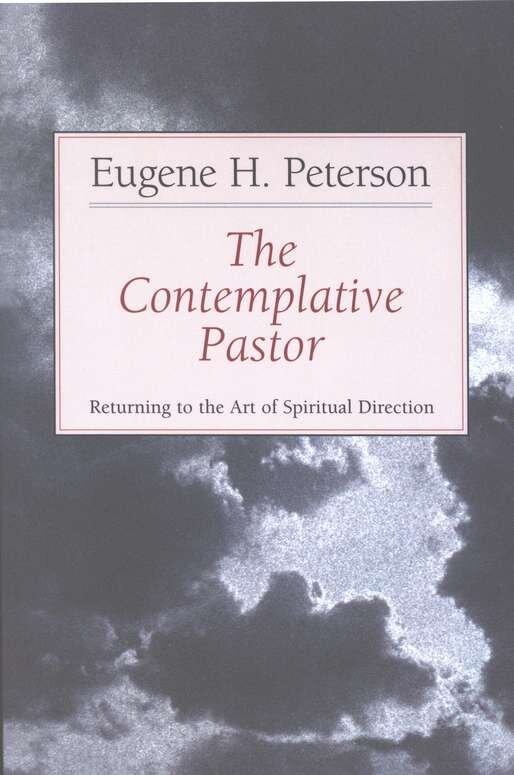Eugene Peterson, The Contemplative Pastor: Returning to the Art of Spiritual Direction. Eerdmans, 1989.
Referenced in: Pastoral Theology
LifeandLeadership.com Summary
This was the third of Eugene Peterson’s work on pastoral theology. It was preceded by Five Smooth Stones for Pastoral Work (1980) and Working the Angles (1987), and followed by Under the Unpredictable Plant (1992) and Pastor: A Memoir (2011). Although Working the Angles (1987) is probably the most often quoted, this one is usually designated as the favorite among pastors.
Peterson writes all of his books from a more introverted and contemplative posture. This sometimes makes it more difficult for ministers who are more extroverted and pragmatic to appropriate some of his insights. This is especially true here. One way of dealing with this is to realize Peterson is usually on target about the direction of ministry, even if the way he illustrates the fulfillment of that direction may be different for those who are wired less contemplatively. As a pragmatist, I still walk away from this book convicted, inspired, and strengthened.
In the opening sections, Peterson discusses the “Sunday work” of the pastor, underscoring the redefinition that must be given the pastoral role if we are to be faithful proclaimers. He couches this redefinition in three terms: unbusy, subversive, and apocalyptic.
Relative to unbusy, he says: “Hilary of Tours diagnosed our pastoral busyness as irreligiosa solicitudo pro Deo, a blasphemous anxiety to do God’s work for him.” (27). Our busyness is related to our insecure need to appear competent and important. But the work of proclamation demands long periods of quiet meditation, giving attention to “prayer and the ministry of the Word.” (Acts 6)
As subversives, we must battle with unspiritual forces that suck people into the temporal world with all of its trappings. Our weapon is truth, especially the story truth of parables, which has lingering effect to help people see reality God’s way. In this, he says the best model is the poet who, like the biblical prophets and psalmists, “are caretakers of language, the shepherds of words, keeping them from harm, exploitation, misuse. Words not only mean something; they are something, each with a sound and rhythm all its own” (161)
To be apocalyptic means that we, like John, learn through prayer and speak through poems, this creative work over against the overly-analytical academic approaches commonly taught.
In the second part, “Between Sundays,” he discusses the day-to-day pastoral roles, referring to them as “practicing the art of prayer in the middle of the traffic.” (54) Here Peterson elevates the ancient craft of the care and cure of souls as opposed to “running a church.” (57) He mentions Annie Dillard’s aisle seat in the theatre of God’s glory to encourage praying with eyes open to what is in nature and the arts. Regarding the ministry of teaching, he insists that ministers not teach as disseminators of knowledge and the church “as a learning center, a kind of mini-university in which I am the resident professor.” Instead, “our primary educational task is to teach people to pray.” (89) He encourages ministers to partner with God to see his growth, neither in passivity as if it is all up to God or the flurry of activity as if we do it all ourselves. He reframes the “ministry of small talk” as a way of being attentive to the way people actually experience their day-to-day lives. In a chapter, “Unwell in a New Way,” he discusses how ministry should help us relate sin and grace in a redemptive way. He also encourages ministers to “lash to the mast” of the ministry of Word and sacrament rather than succumbing to the pressure to appear professional. He also discusses the importance of self-care, especially through sabbaticals.
From the Publisher
Pastor-teacher Eugene Peterson has written a book of wisdom and refreshment for busy pastors illustrated with engaging personal anecdotes and including poetic reflections on the Beatitudes and discussions of such themes as curing souls, the language of prayer, the ministry of small talk, and sabbatical.
About the Author
Eugene H. Peterson is a pastor, scholar, writer, and poet. After teaching at a seminary and then giving nearly 30 years to church ministry in the Baltimore area, he created The Message – a vibrant Bible paraphrase that connects with today’s readers like no other.
***For additional information on this resource, including reviews, click the bookstore links. Check the reference at page top or the links below for resource guides on related topics.***
See Other Resource Guides on Pastoral Theology:
- Minister Self-Care
- Ministry Burnout, Prevening and Overcoming
- Ministry Ethics
- Ministry Support Systems
- Strengthening and Renewing the Ministry Call
- Theology of Mission and Ministry
See Resources on Over 100 Ministry Topics:


